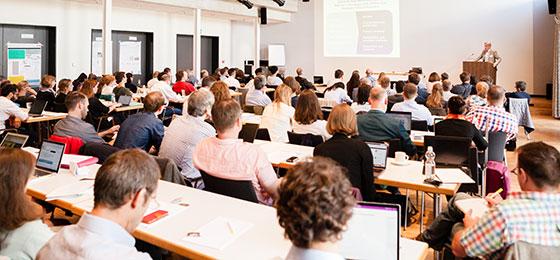Programme conference 2018: intensified internal dialogue

At the second programme conference of NRP 72, researchers were able to share ideas with each other, as well as with representatives of the Confederation and Innosuisse.
Focus on scientific exchanges
At the time of the programme conference, NRP 72 already comprised 42 projects. As a result, the gathering on 18/19 April at the Hotel Sempachersee in Nottwil was quite large. More than a hundred researchers took the opportunity to get to know each other and their projects and to find out more about potential collaboration opportunities and synergies. To facilitate this, the conference programme focused on short project presentations during plenary sessions, while poster sessions allowed for more detailed discussions.
Overview of international research initiatives
Christoph Dehio, president of the Steering Committee of NRP 72, was the conference moderator. Another important topic of the event was the context in which the research is conducted. The path from research funding to implementing results was subject of various contributions. In view of the urgency in tackling antimicrobial resistance, many funding schemes have been created worldwide in the last few years. Herman Goossens gave a good overview of existing and future international initiatives in his keynote speech. Goossens is a member of the Steering Committee of NRP 72 and, as an expert in many bodies, including EU and WHO bodies, he has an in-depth understanding of the global context.
Annalise Eggimann, director of the Swiss Innovation Agency Innosuisse, shone the spotlight on funding opportunities in Switzerland. She explained how the new agency, created to succeed the Commission for Technology and Innovation CTI at the beginning of 2018, was planning to promote projects in-between research and industry.
Communicating with the public and politicians
Stéphane Praz, head of knowledge and technology transfer, talked about the importance of communicating scientific results. He explained how important it was to enter into a dialogue with the public if we want to ensure that scientific results have an impact on social and political processes. Referring to a number of practical examples, he showed how research topics and results find their way into mainstream media.
Karin Wäfler, representative of the federal government in NRP 72 and project leader of the National Strategy on Antibiotic Resistance (StAR), then provided an overview of the StAR implementation and explained what politicians are expecting from researchers. During a poster session, she and Nadine Metzger of the Federal Food Safety and Veterinary Office engaged in a lively discussion with researchers.
During the second programme conference of NRP 72, the various actors working in the field of antimicrobial resistance research got to know each other. This will lend further support to the research as well as the implementation of results.
